The 107th Tour de France will be an edition like no other.
Riders will sign on in face masks before much-reduced crowds, racing under the looming threat they might not make it to Paris at all in these unique times.
The Tour is and long has been hugely symbolic for France. The only years it has not taken place since its debut in 1903 came during the world wars.
It has otherwise rolled on through security threats, protests and much more besides in a manner intended to mirror the nation it represents.
It does so as a celebration of a sport which can come to its spectators, rather than the other way around.
Cycling is sport in the wild – its greatest asset is that it uses the world's most dramatic scenery as its stadium.
But in these times that is also its weakness. Creating anything resembling a biosecure bubble is impossible for this vast rolling circus.
And so when riders roll out of Nice on Saturday morning, Paris will rarely have felt so far away.
Under protocols issued by organisers ASO, the race will continue even if there is a positive test within the peloton, but teams have been warned that two positive tests within their camp during the race would see their entire squad withdrawn and sent home.
What is not clear is at what point the continuation of the race itself would be in question.
Racing resumed across Europe in late July and has, on the whole, been a resounding success – with no repeat of the events which saw the UAE Tour abandoned in late February after a suspected outbreak among team staff there.
But on Tuesday, as teams were beginning to gather in Nice, there was a reminder of the risks as Bora-Hansgrohe withdrew from the Bretagne Classic at the 11th hour after one of their riders tested positive – though the team later said it was likely to have been a false positive.
Against this jeopardy, a fascinating battle for yellow should unfold, though not the one that was forecast.
When racing resumed, Team Ineos – who will race as the Ineos Grenadiers in France – were testing out a three-headed monster of Egan Bernal, Chris Froome and Geraint Thomas, all former winners.
Meanwhile Jumbo-Visma, who have invested all they can to end Ineos’ run of seven wins in the last eight years, were ready to counter with Primoz Roglic, Tom Dumoulin and Steven Kruijswijk.
But then Ineos dropped the bombshell that Froome and Thomas would stay home due to a lack of form, while their Dutch rivals lost Kruijswijk to a shoulder injury, then saw Roglic suffer a heavy crash at the Criterium du Dauphine to leave questions over his own fitness.
The race is now more likely to dance to the tune of the Colombian national anthem as Rigoberto Uran, Daniel Martinez, Sergio Higuita, Nairo Quintana and Miguel Angel Lopez queue up to challenge defending champion Bernal.
Thibaut Pinot will carry the weight of French hopes, 35 years after Bernard Hinault was the last home winner.
Pinot was in contention before being forced to abandon on stage 19 of last year’s race, the fourth time he had failed to finish the Tour in his seven starts to date.
Soon after, a hailstorm forced a landslide and what promised to be a fascinating climax to a tense battle for yellow was effectively washed away, with the penultimate two stages hugely compromised by the weather.
This year we must hope that forces even greater do not interrupt the show.
THE STAGES
D-3! We've been waiting for it impatiently and #TDF2020 is almost here!
— letourdata (@letourdata) August 26, 2020
3⃣ weeks of cycling 🚴♂️
3⃣4⃣8⃣4⃣ km of racing 🛣️
♾ billions of data points to analyse📊
Let’s get this cycling party started 🎉 pic.twitter.com/LluYQae8Jy
Stage one – 29 August – Nice – Nice – 156km
It will be a lumpy opening to the Tour as the pack heads twice over the Cote de Rimiez above Nice, but there is time for them to regroup before an expected sprint finish on the Promenade des Anglais
Stage two – 30 August – Nice – Nice – 186km
There will be no easing into this year's race, which heads over two category one climbs on the second day as riders tackle the Col de la Colmiane and Col de Turini as well as another favourite of Paris-Nice, the Col d’Eze. A punchy finale could be ideal for Julian Alaphilippe to get another spell in yellow.
Stage three – 31 August – Nice – Sisteron – 198km
This should be another stage for the sprinters – something at a premium in this year’s race – but they will have to get over some difficult terrain along the Route Napoleon before the largely downhill run into Sisteron.
Stage four – 1 September – Orcieres – Merlette – 157km
The early challenges keep coming as the race ventures into the Alps on only the fourth day, reaching a summit finish at the ski resort of Orcieres-Merlette, some 1,825 metres above sea level. It will be a key early marker in the battle for yellow, but who will want to be defending it so early?
Stage five – 2 September – Gap – Privas – 183km
Sprinters will have their eye on a stage which is largely downhill as they run away from the Alps, but with a category four climb over the Cote de Saint-Vincent-de-Barres just 15km out and a drag up to the finish in Privas, there could be late attacks.
Stage six – 3 September – Le Teil – Mont Aigoual – 191km
It is only stage six and there is already a second summit finish as the race goes up to Mont Algoual on an incursion into the Massif Central. These are the sorts of days when those focused on yellow must make sure no time is lost, while stage hunters might have their fun.
Stage seven – 4 September – Millau – Lavaur – 168km
The journey east continues with something of a transition stage. The long climb over the Col de Peyronnenc in the middle of the stage will prove the key point, an opportunity for a breakaway to build up a sizable lead before the sprint teams engage on the long, mostly downhill run to the finish.
Stage eight – 5 September – Cazeres-sur-Garonne- Loudenvielle – 141km
The race enters the Pyrenees with a suitably tough day of climbing, including the first hors categorie climb of the race – the Port de Bales. That should split up the favourites before the Col de Peyresourde, where there is an eight-second time bonus on offer at the summit before the run down to Loudenvielle.
Stage nine – 6 September – Pau – Laruns – 154km
Breakaway specialists will target a stage that is lumpy but far from brutal, and which should be decided by the Col de Marie Blanque 18km from the finish in Laruns.
Stage 10 – 8 September – Ile d’Oleron – Ile de Re – 170km
The only day on the Tour without a categorised climb, the route profile for stage 10 is essentially pan flat as riders emerge from the rest day. But the route up the Atlantic coast will leave the race vulnerable to the westerly winds of the North Atlantic Oscillation, making this a day full of peril for the overall contenders.
Stage 11 – 9 September – Chatelaillon Plage – Poitiers- 167km
The race turns westward with what looks on paper to be a fairly benign stage, any wind likely to be of the tail variety and barely a climb in sight. The sprint teams will surely not let this opportunity pass them by.
Stage 12 – 10 September – Chauvigny – Sarran Correze- 218km
A long day in the saddle beckons over rolling roads on the route back to the Massif Central. The contenders would most likely be happy to see a breakaway go and contest stage honours while marking each other over the Suc au May late in the stage.
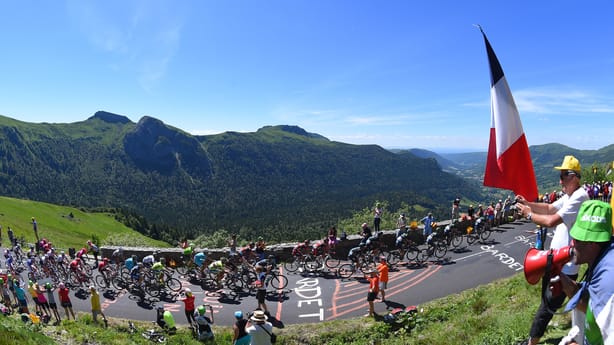
Stage 13 – 11 September – Chatel Guyon – Puy Mary Cantal – 191km
The red dots that indicate categorised climbs pockmark the stage 13 profile like a case of chickenpox. Flat ground is at a premium on a day which could prove one of the toughest of the whole Tour, and one that could prove pivotal. It reaches its climax on the Pas de Peyrol, the highest paved road in the Massif Central.
Stage 14 – 12 September – Clermont-Ferrand – Lyon – 197km
With the Alps looming, the contenders will focus on staying safe on a tricky looking stage into Lyon. Some tough early climbs to sap the legs before two punchy climbs on the final run into town where victory will be decided.
Stage 15 – 13 September – Lyon – Grand Colombier – 175km
A summit finish on the hors categorie Grand Colombier will find out what the contenders have left. The final climb, 17.4km long at an average of 7.1%, will be unforgiving on anyone in urgent need of the rest day to come.
Stage 16 – 15 September – Le Tour du Pin – Villard de Lands – 164km
To start the final week the Tour will pay a rare visit to the Vercors, a region characterised by narrow roads and steep gradients – the sort of territory which could be used for an ambush by anyone needing to shake up the GC standings as time runs down.
Stage 17 – 16 September – Grenoble – Meribel col de la Loze – 168km
The toughest summit finish of the whole Tour could settle the battle for yellow. After the Col de la Madeleine softens the legs, the 21.5km climb of the Col de la Loze could break them. The gradient averages 7.8% but frequently tops 20 on its way to a height of 2,304m above sea level.
Stage 18 – 17 September – Meribel – La Roche-sur-Foron – 168km
Four more big climbs come a day later on a rollercoaster of a stage to La Roche-sur-Foron, highlighted by the hors categorie climb to the gravel roads on the Plateau des Glieres. None of the contenders can afford a bad day.
Stage 19 – 18 September – Bourg-en-Bresse – Champagnole – 166.5km
A rolling stage will test which of the sprinters have survived the Alps. The finish into Champagnole is largely downhill, so any breakaway will need a healthy lead to stay away.
Stage 20 – 19 September – Lure – La Planche des Belles Filles – 36km TT
La Planche des Belles Filles has emerged as a Tour favourite in recent years, and no wonder given some of the drama it has delivered. Thibaut Pinot will dream of a coronation on his local climb, but time trialling is not a strong suit so he will need to have plenty in hand before the day begins.
Stage 21 – 20 September – Mantes-la-Jolie – Paris Champs-Elysees – 122km
Time for champagne glasses to clink before the now traditional sprint finish in Paris – and most of the celebrations may come from organisers if the race has made it this far unscathed amid the pandemic.
THE CONTENDERS
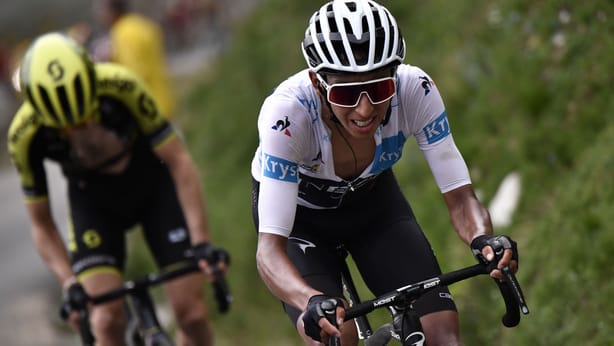
Egan Bernal
Age: 23
Nationality: Colombian
Team: Ineos Grenadiers
Previous appearances: 2018 (15th), 2019 (1st)
Stage wins: None
Dave Brailsford's decision to leave both Froome and Thomas at home represented a changing of the guard at Team Ineos – or the Ineos Grenadiers as they will be known for the next month. Bernal showed the future is now, with his victory ahead of Thomas in last year’s Tour, and goes into the race as the undisputed leader of the team that has won seven of the past eight editions. He returned from lockdown with victory in La Route d’Occitanie and second place in the the Tour de l’Ain, but withdrew from the Criterium du Dauphine as a precaution after suffering a back injury – something the team has downplayed.
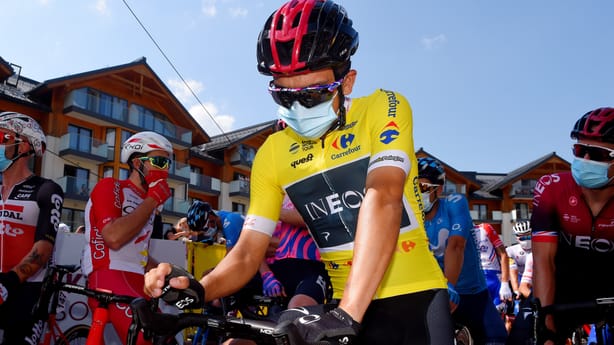
Richard Carapaz
Age: 27
Nationality: Ecuadorian
Team: Ineos Grenadiers
Previous appearances: None
Stage wins: None
Should anything go wrong for Bernal, Ineos have an able deputy in Carapaz. Though he is making his Tour debut, the Ecuadorian has proven his Grand Tour credentials in the Giro d’Italia, winning the race last year after taking fourth place in 2018. Carapaz was a winter signing from Movistar, seen as an indulgence upon arrival given Ineos’ existing riches, but his selection suggests Brailsford was already thinking about a change of focus within his team.
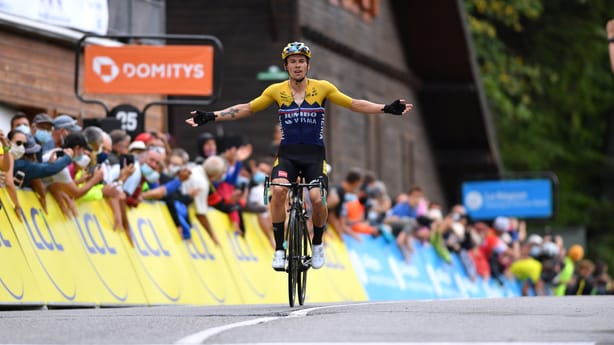
Primoz Roglic
Age: 30
Nationality: Slovenian
Team: Jumbo-Visma
Previous appearances: 2017 (38th), 2018 (4th)
Stage wins: Two (2017 – stage 17, 2018 – stage 19)
Jumbo-Visma have put everything into challenging the Ineos’ dominance of the Tour, and planned to go to France with a triple-headed monster of their own. However, Steven Kruijswijk will miss the race with a back injury, and Roglic – the man in form since racing resumed – has question marks over him after a heavy crash in the Criterium du Dauphine, which he was leading at the time of his tumble. Roglic is back training, but must quickly recapture the form which saw him win the Tour de l’Ain ahead of a strong field.
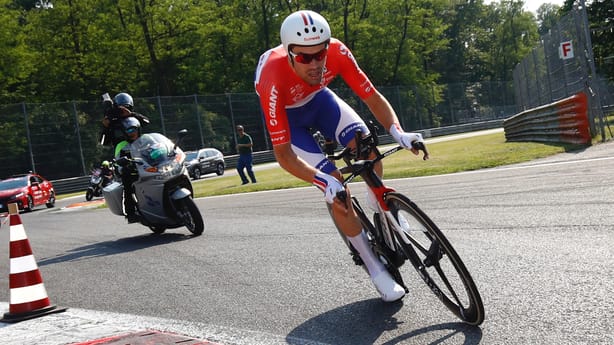
Tom Dumoulin
Age: 29
Nationality: Dutch
Team: Jumbo-Visma
Previous appearances: 2013 (41st), 2014 (33rd), 2015 (DNF – crashed on stage three), 2016 (DNF – crashed on stage 19), 2018 (2nd).
Stage wins: Three (2016 – Stage nine and stage 13, 2018 – stage 20).
Should Roglic struggle, Jumbo-Visma will put the focus on Dumoulin. The 2017 Giro d’Italia winner could not match his team-mate’s form in the build-up races, 11th in the Tour de l’Ain and seventh in the Dauphine, but his calibre is clear with three Grand Tour podium finishes to his name, including second place behind Thomas in the 2018 Tour. The lack of time trialling in this year’s Tour will not please the man who took Olympic silver in the 2016 time trial, but he has proven his power over the climbs in recent years.
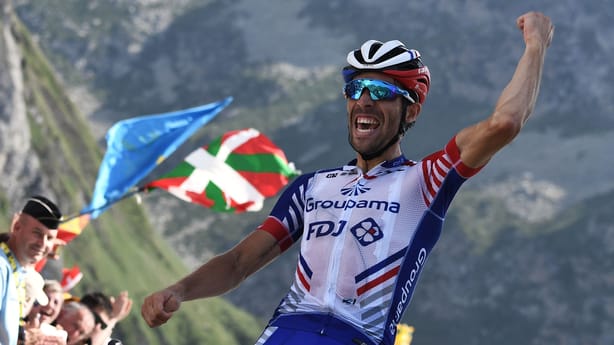
Thibaut Pinot
Age: 30
Nationality: French
Team: Groupama-FDJ
Previous appearances: 2012 (10th), 2013 (DNF – withdrew after stage 15), 2014 (3rd), 2015 (16th), 2016 (DNF – withdrew after stage 12), 2017 (DNF – abandoned on stage 17), 2019 (DNF – abandoned on stage 19).
Stage wins: Three (2012 – stage 8, 2015 – stage 20, 2019 – stage 14).
Pinot has emerged as the best French hope to end what is now a 35-year wait for a home winner, but his main barrier to success in recent years has been an inability to reach Paris. He went home early for a fourth time last year, his most frustrating exit yet as he had begun stage 19 fifth overall and still with a shout of yellow in what had been building into a fascinating climax before the weather intervened.
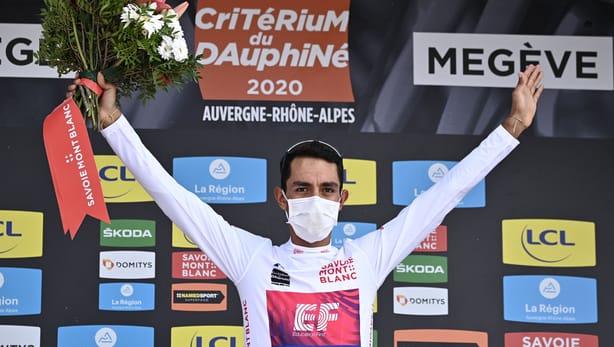
Daniel Martinez
Age: 24
Nationality: Colombian
Team: EF Education First
Previous appearances: 2018 (36th)
Stage wins: None
Rigoberto Uran will perhaps be deemed the EF team leader given his experience in the race – having finished second in 2017 – but his younger compatriot looks the more intriguing prospect. Roglic’s misfortune in the Dauphine was his opportunity as he came through to take the biggest victory of his career in a race which has so often pointed the way in terms of Tour form. It would be a big ask for a debutant to win the Tour, but in a strange year for cycling, strange results cannot be ruled out.
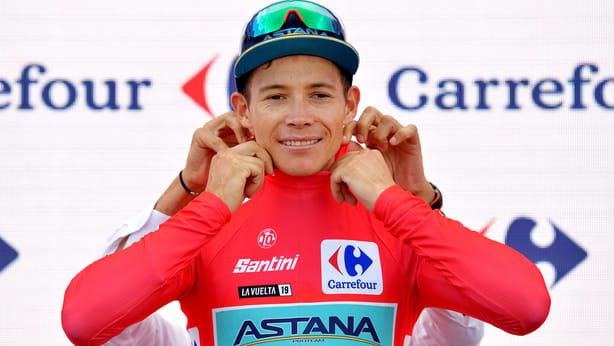
Miguel Angel Lopez
Age: 26
Nationality: Colombian
Team: Astana
Previous appearances: None
Stage wins: None
'Superman’ may have never ridden the Tour before but he has proven his credentials with five top-10 finishes across the Giro d’Italia and Vuelta a Espana, finishing third in both races in 2018. The explosive climber has been favoured over Jakob Fuglsang, who will instead target the Giro, a considerable show of faith from his team.
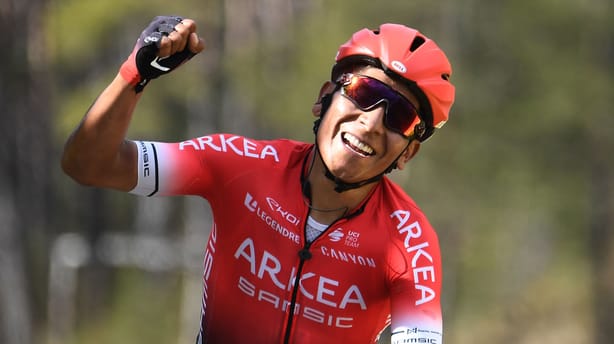
Nairo Quintana
Age: 30
Nationality: Colombian
Team: Arkea-Samsic
Previous appearances: 2013 (2nd), 2015 (2nd), 2016 (3rd), 2017 (12th), 2018 (10th), 2019 (8th).
Stage wins: Three (2013 – stage 20, 2018 – stage 17, 2019 – stage 18)
Quintana’s star has dimmed considerably since he finished second on his Tour debut in 2013, with his run of podium finishes a distant memory. That is perhaps illustrated by the fact that, when it came to leaving Movistar in the winter, he dropped out of the WorldTour by signing for Arkea-Samsic, even if the team was nailed on for a Tour wildcard. But his new employers do offer complete support for his general classification ambitions, and it will be fascinating to see how he fares after showing strong form before the season was suspended.
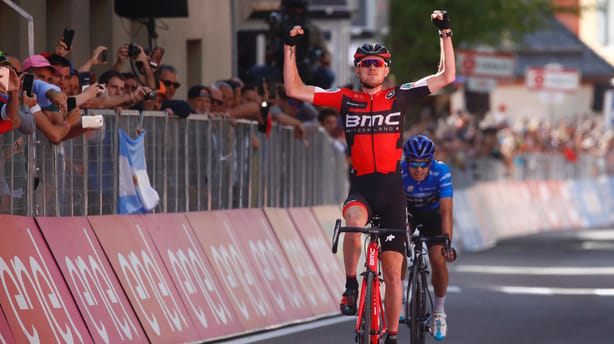
Mikel Landa
Age: 30
Nationality: Spanish
Team: Bahrain-McLaren
Previous appearances: 2016 (35th), 2017 (4th), 2018 (7th), 2019 (6th).
Stage wins: None
Bahrain-McLaren are all-in on the fight for yellow, leaving sprinter Mark Cavendish at home so the focus will be on Landa – another rider to leave Movistar in the winter. The Spaniard has long been frustrated in his desire to go to a Grand Tour with unquestioned leadership status, but Rod Ellingworth will give him exactly that this summer. He should be ably supported by ex-Team Ineos man Wout Poels, Pello Bilbao and Damiano Caruso, and this looks like his best chance to contend for yellow.
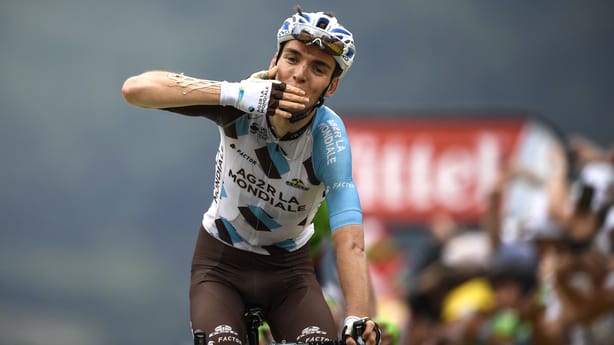
Romain Bardet
Age: 29
Nationality: French
Team: AG2R La Mondiale
Previous appearances: 2013 (15th), 2014 (6th), 2015 (9th), 2016 (2nd), 2017 (3rd), 2018 (6th), 2019 (15th).
Stage wins: Three (2015 – stage 18, 2016 – stage 19, 2017 – stage 12)
After carrying the burden of French hopes for several years, Bardet suffered frustration at last year’s Tour as his challenge faded badly. As a result, he goes into this year’s race downplaying talk of a challenge for yellow and saying the focus is on stages. But with only one time trial and a route that should suit him, it is not hard to imagine he is simply trying to deflect some attention.

